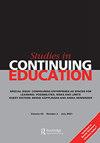Getting social: postgraduate students use of social media
IF 1.9
4区 教育学
Q2 EDUCATION & EDUCATIONAL RESEARCH
引用次数: 4
Abstract
ABSTRACT Social media are becoming increasingly popular in a professional context and, if used appropriately, can be beneficial to postgraduate students. Little is known regarding the extent to which postgraduate students engage with social media for postgraduate purposes. The present study aimed to understand postgraduate students’ general use of social media, as well as investigate social media use specifically for postgraduate (educational and/or scientific) purposes. A total of 231 postgraduate students from 45 countries completed a mixed-methods survey. Instagram was the most frequently used social media platform overall, with Twitter being the most commonly used for postgraduate purposes. Most students posted educational and/or scientific content on social media platforms, with approximately one-third having a social media account specific for postgraduate/scientific content. The most common reasons postgraduate students access social media for postgraduate-related purposes were personal connection with community, science communication, motivations and learning, and networking. The most common reasons for posting postgraduate content online were self-branding, accessing a broad audience, science communication, and building a postgraduate community. Overall, postgraduate students are commonly using social media for postgraduate purposes which presents opportunities to mitigate pitfalls of the student experience and promote positive mental health among this group.社交:研究生使用社交媒体
摘要社交媒体在专业环境中越来越受欢迎,如果使用得当,对研究生来说是有益的。关于研究生为研究生目的参与社交媒体的程度,人们知之甚少。本研究旨在了解研究生对社交媒体的普遍使用,并调查专门用于研究生(教育和/或科学)目的的社交媒体使用情况。共有来自45个国家的231名研究生完成了一项混合方法调查。Instagram是最常用的社交媒体平台,Twitter是最常用于研究生目的的平台。大多数学生在社交媒体平台上发布教育和/或科学内容,约三分之一的学生拥有专门针对研究生/科学内容的社交媒体账户。研究生出于研究生相关目的访问社交媒体的最常见原因是与社区的个人联系、科学交流、动机和学习以及网络。在网上发布研究生内容最常见的原因是自我品牌、接触广泛的受众、科学交流和建立研究生社区。总的来说,研究生通常将社交媒体用于研究生目的,这为减轻学生体验的陷阱和促进这一群体的积极心理健康提供了机会。
本文章由计算机程序翻译,如有差异,请以英文原文为准。
求助全文
约1分钟内获得全文
求助全文
来源期刊

Studies in Continuing Education
EDUCATION & EDUCATIONAL RESEARCH-
CiteScore
4.70
自引率
6.70%
发文量
22
期刊介绍:
Studies in Continuing Education is a scholarly journal concerned with all aspects of continuing, professional and lifelong learning. It aims to be of special interest to those involved in: •continuing professional education •adults learning •staff development •training and development •human resource development
 求助内容:
求助内容: 应助结果提醒方式:
应助结果提醒方式:


